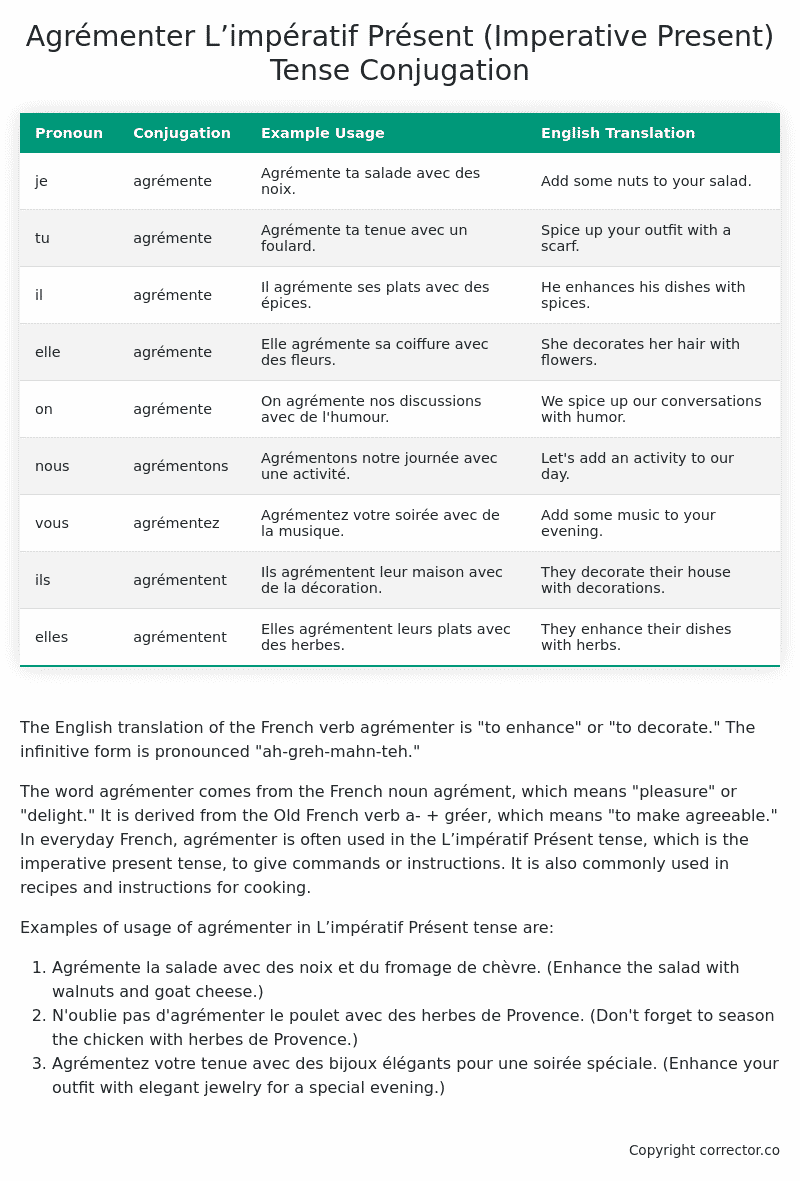L’impératif Présent (Imperative Present) Tense Conjugation of the French Verb agrémenter
Introduction to the verb agrémenter
The English translation of the French verb agrémenter is “to enhance” or “to decorate.” The infinitive form is pronounced “ah-greh-mahn-teh.”
The word agrémenter comes from the French noun agrément, which means “pleasure” or “delight.” It is derived from the Old French verb a- + gréer, which means “to make agreeable.” In everyday French, agrémenter is often used in the L’impératif Présent tense, which is the imperative present tense, to give commands or instructions. It is also commonly used in recipes and instructions for cooking.
Examples of usage of agrémenter in L’impératif Présent tense are:
- Agrémente la salade avec des noix et du fromage de chèvre. (Enhance the salad with walnuts and goat cheese.)
- N’oublie pas d’agrémenter le poulet avec des herbes de Provence. (Don’t forget to season the chicken with herbes de Provence.)
- Agrémentez votre tenue avec des bijoux élégants pour une soirée spéciale. (Enhance your outfit with elegant jewelry for a special evening.)
Table of the L’impératif Présent (Imperative Present) Tense Conjugation of agrémenter
| Pronoun | Conjugation | Example Usage | English Translation |
|---|---|---|---|
| je | agrémente | Agrémente ta salade avec des noix. | Add some nuts to your salad. |
| tu | agrémente | Agrémente ta tenue avec un foulard. | Spice up your outfit with a scarf. |
| il | agrémente | Il agrémente ses plats avec des épices. | He enhances his dishes with spices. |
| elle | agrémente | Elle agrémente sa coiffure avec des fleurs. | She decorates her hair with flowers. |
| on | agrémente | On agrémente nos discussions avec de l’humour. | We spice up our conversations with humor. |
| nous | agrémentons | Agrémentons notre journée avec une activité. | Let’s add an activity to our day. |
| vous | agrémentez | Agrémentez votre soirée avec de la musique. | Add some music to your evening. |
| ils | agrémentent | Ils agrémentent leur maison avec de la décoration. | They decorate their house with decorations. |
| elles | agrémentent | Elles agrémentent leurs plats avec des herbes. | They enhance their dishes with herbs. |
Other Conjugations for Agrémenter.
Le Present (Present Tense) Conjugation of the French Verb agrémenter
Imparfait (Imperfect) Tense Conjugation of the French Verb agrémenter
Passé Simple (Simple Past) Tense Conjugation of the French Verb agrémenter
Passé Composé (Present Perfect) Tense Conjugation of the French Verb agrémenter
Futur Simple (Simple Future) Tense Conjugation of the French Verb agrémenter
Futur Proche (Near Future) Tense Conjugation of the French Verb agrémenter
Plus-que-parfait (Pluperfect) Tense Conjugation of the French Verb agrémenter
Passé Antérieur (Past Anterior) Tense Conjugation of the French Verb agrémenter
Futur Antérieur (Future Anterior) Tense Conjugation of the French Verb agrémenter
Subjonctif Présent (Subjunctive Present) Tense Conjugation of the French Verb agrémenter
Subjonctif Passé (Subjunctive Past) Tense Conjugation of the French Verb agrémenter
Subjonctif Imparfait (Subjunctive Imperfect) Tense Conjugation of the French Verb agrémenter
Subjonctif Plus-que-parfait (Subjunctive Pluperfect) Tense Conjugation of the French Verb agrémenter
Conditionnel Présent (Conditional Present) Tense Conjugation of the French Verb agrémenter
Conditionnel Passé (Conditional Past) Tense Conjugation of the French Verb agrémenter
L’impératif Présent (Imperative Present) Tense Conjugation of the French Verb agrémenter (this article)
L’infinitif Présent (Infinitive Present) Tense Conjugation of the French Verb agrémenter
Struggling with French verbs or the language in general? Why not use our free French Grammar Checker – no registration required!
Get a FREE Download Study Sheet of this Conjugation 🔥
Simply right click the image below, click “save image” and get your free reference for the agrémenter L’impératif Présent tense conjugation!

Agrémenter – About the French L’impératif Présent (Imperative Present) Tense
Usage
Giving commands
Making requests
Offering advice
Expressing desires
Conjugation Formation
Interactions with other tenses
Want More?
I hope you enjoyed this article on the verb agrémenter. Still in a learning mood? Check out another TOTALLY random French verb conjugation!


